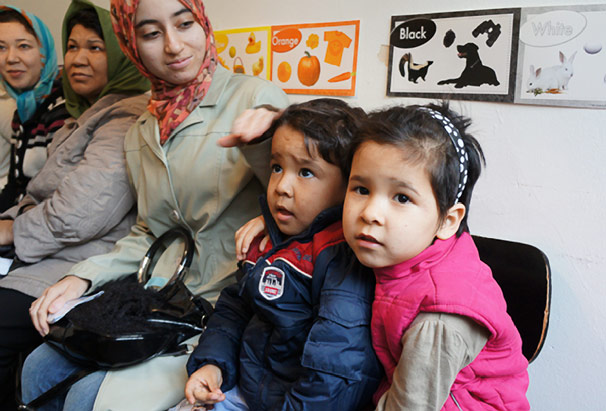
Ministry Updates
Why We Love Immigrants
July 15, 2014
by Interactive Supply

Earlier this year, a TEAM worker watched as two men embraced. One of the men was a Muslim who had become a Christian, and one was a former Islamic fundamentalist who, until recently, had been abusing the other man. Now he was asking more about Jesus.
This didn’t happen in Afghanistan or Pakistan or Iraq. It was in an immigrant community in southern Europe.
Immigration is not just a hot topic in the United States. In fact, it is a much more formidable issue in many other countries. Per capita, at least 20 nations receive more immigrants than the United States does.
But for all the complexity and controversy surrounding immigration, the Christian community should agree on at least one thing: Immigrant ministry is a unique opportunity to share the love of Christ and obey Jesus’ command to show compassion among some of the most vulnerable people on earth.
At TEAM, serving diaspora communities is one of our core ministry focus areas (we have 24 of them in total). We minister among immigrant and refugee populations primarily in Europe, but also in the Americas. Civil war, political unrest, religious persecution and economic meltdowns in Sudan, Afghanistan, North Africa and the Middle East have driven tens of thousands of immigrants to Europe in the last two years, with the most recent surge coming from Syria. Countries such as Greece and Italy have become epicenters of immigration from primarily Muslim regions.
These immigrants often endure horrifying journeys to escape their situations. We are familiar, of course, with the grueling trips that immigrants in the American Southwest make through the unforgiving desert. Migrants emigrating to Europe, after escaping war zones, often endure equally precarious sea crossings aboard unsafe ships — and many don’t survive the journey.
Many of these immigrants are in desperate circumstances. We sometimes refer to them as “refugees” because they are fleeing violence or persecution in their homelands, but in reality very few receive any of the benefits we may think of when picturing, say, war-ravaged “lost children” from Uganda who have been resettled in the United States as official refugees. For example, of the estimated 10,000 or more Syrians who have entered Greece since 2011 because of the brutal civil war in their country, only a tiny handful have received refugee status. The rest are simply undocumented immigrants that human rights groups say are suffering in deplorable conditions and often being abused by police and other authorities.
TEAM workers in places like this reach out to immigrants through simple gestures of kindness like providing meals, showers and laundry services. They also lead Bible studies, pray with immigrants, and lend support to the many churches that are growing with new immigrant worshipers.
That, in fact, is one bright spot amid so much difficulty for immigrants and refugees in Europe. As has happened in much of the United States, immigrants in Europe are helping revive churches and bring a renewed interest in Christ to cities that otherwise grew cold toward religion long ago. Many immigrants come to churches simply seeking community and eventually find a relationship with Christ.
Because of the sensitive nature of much of TEAM’s immigrant ministry in Europe, we are understandably careful about sharing specifics or citing sources for the great stories we receive from the field. But the value of the ministry is undeniable. And perhaps just as valuable is the opportunity we all have today, as Christians, to step into immigrant communities in our own backyards and ask the simple question, how would Jesus show love to these people?
Think you might have a heart for serving in missions among immigrant and refugee populations? Contact a missions coach to chat about how you can begin preparing now to “welcome the stranger.”
Related articles


